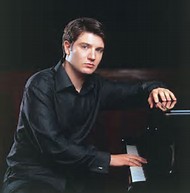APA presents Alessio Bax: 'Italian Inspirations' from a pre-COVID-19 peninsula
 |
| Alessio Bax conveyed "Italian Inspirations" |
The third program in American Pianists Association's "Grand Encounters" series this season adhered to the theme "Italian Inspirations." The recital was rooted in Italian musical sources or generated from the the legacy of two notable Italians, St. Francis and Dante.
A theme made famous by Arcangelo Corelli but not originating with him has nearly pan-European provenance. "La Folia," as applied after the model of the Italian baroque composer's violin piece of that title, was worked into a masterpiece for solo piano by Sergei Rachmaninoff. The result, Variations on a Theme of Corelli, brought Bax's recital up to intermission.
It was characteristic of Bax's playing that he used the sustaining pedal in masterly fashion. He had control over a variety of colors in the course of the 20 variations. There was an evocation of bell-ringing dear to Rachmaninoff's muse and there were evanescent passages suggesting mist rising over the Russian steppes. A bounding "hunt" variation hinted at Schumann, but the idiom was clearly the Russian composer's own. A more familiar work, his piano-orchestra Rhapsody on a Theme of Paganini, was brought to mind in several places: There was even an adept lyrical manipulation of the theme, though its magic is far from the indelible beauty of the Rhapsody's 18th variation. Bax conjured every bit of it, however.
Both his limpid phrasing and the organization he brought to complex textures were hinted at in J.S. Bach's version of Alessandro Marcello's Oboe Concerto in D minor. The second-movement theme had the lift of well-supported singing, with the left hand subordinate but never in danger of vanishing. Counterpoint in the Presto finale always displayed a clear outline.
Italian modernism, in the form of a set of miniatures by Luigi Dallaspiccola, opened the recital's second half. In Quaderno musicale di Annalibera, fragmentary and disjunctive melodies unfolded with unerring connectedness. Linked voices in different registers consistently cohered. Near the end, shading of tone color conveyed the painterly effect of chiaroscuro. The final movement, subduing some of the composition's rigorous profile on display earlier, was haunting and subdued.
Bax linked two programmatic Liszt works to bring the recital to a rousing conclusion. "St. Francis of Assisi's Sermon to the Birds" offered a view of saintly absorption in nature's wonders. The delicate chittering and chirping at the start was soon underlaid with mid-range melodicism. Unsurprisingly, Bax showed his affinity for characterization of both winged and earthbound characters alike. The pulpit is more like a round table: birds and man seem more in colloquy, praising their Creator.
"Apres un lecture de Dante: Fantasia quasi Sonata" is one of the Hungarian composer's major lengthy works. It focuses mainly on the story of the adulterous Francesca da Rimini in the Inferno portion of Dante's epic poem, "The Divine Comedy." There are episodes that bring in the work's other two parts as well, Purgatorio and Paradiso. Bax offered an interpretation that used lots of pedal, but as was already evident from his performance up to that point, he always knew what to subordinate and what to emphasize. Nothing was messy; there was no empty grandstanding. His articulation was so commanding that the most intense torrents of sound never came off blurry, even with the extra resonance he applied. Bax made the work's occasional silences stunning in emotional effect. As memorable as the recital had been before the Liszt diptych, it attained particular luster at the end.
Both his well-focused energy and his knack for exquisitely proportioned tone painting were confirmed by two encores: Brahms/Cziffra/Bax's Hungarian Dance no. 5 and Scriabin's Prelude for the Left Hand.



Comments
Post a Comment